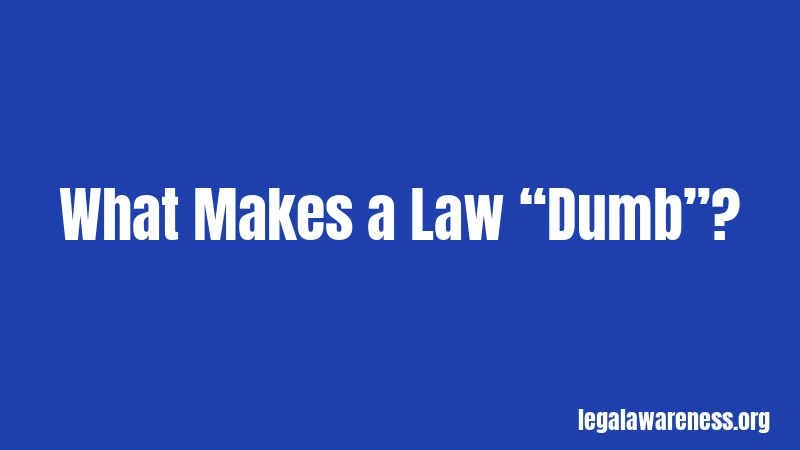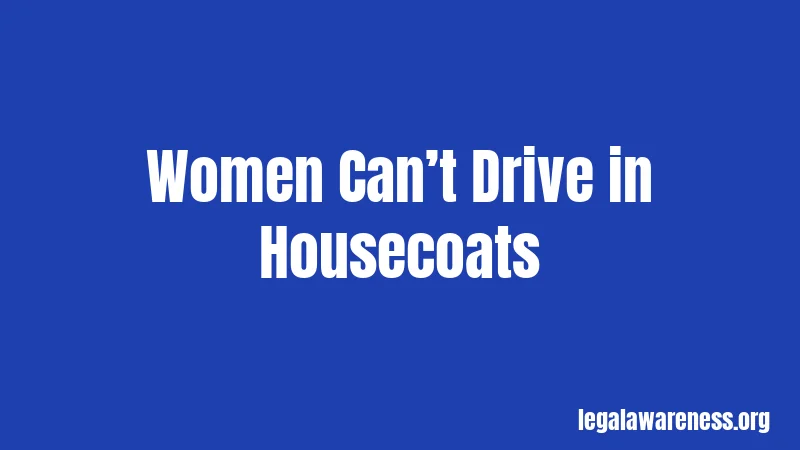Dumb Laws in California (2026): Bizarre Rules Still on the Books
Most people think California laws are pretty normal. Speed limits. No stealing. Don’t punch people. Makes sense, right?
Then you dig a little deeper. You find out women can’t drive in housecoats. Peacocks have right-of-way in some cities. And wearing fake whiskers during a crime makes it even worse.
Yep, these are real laws. Let’s explore the weirdest, dumbest, and most head-scratching laws still on California’s books.
What Makes a Law “Dumb”?

Here’s the thing. These laws weren’t created to be silly. They actually had purposes when they were written. Some date back over 150 years. Others were created to solve specific problems that don’t exist anymore.
The problem is nobody bothered to remove them from the books. It’s easier to make new laws than delete old ones. So California ends up with hundreds of bizarre rules that make you wonder what happened to inspire them.
Some of these laws are statewide. Others only apply to specific cities. But they’re all technically still enforceable, even if police never actually write tickets for them.
Hold on, this part is important. Just because a law sounds dumb doesn’t mean it can’t get you in trouble. Most of these are rarely enforced, but “rarely” isn’t the same as “never.”
The False Whiskers Law
This one’s my favorite. California Penal Code Section 185 makes it illegal to wear false whiskers while committing a crime. Seriously.
The law was written in 1872. Back then, fake beards and mustaches were apparently a common way for criminals to disguise themselves. Picture an Old West bank robber slapping on a fake mustache before holding up the stagecoach.
Today, the law is still on the books. It covers any mask, false whiskers, or personal disguise used to evade police during or after committing a crime.
Breaking this law is a misdemeanor. You could face up to six months in county jail. That’s on top of whatever punishment you get for the actual crime.
Wait, it gets better. The law specifically mentions “false whiskers” separate from masks. Whether you wear complete or partial fake facial hair matters in the eyes of the law.
Not sure what counts as a violation? The law is very specific. It only applies if you’re using the disguise to avoid being caught. Halloween costumes don’t count. Neither does wearing sunglasses on a sunny day.
Women Can’t Drive in Housecoats

Throughout California, it’s illegal for women to drive while wearing a housecoat. Men can wear whatever they want. Just women can’t drive in housecoats.
Nobody enforces this law anymore. I’ve never heard of anyone getting a ticket for it. But it’s still technically on the books.
This law probably dates back to when housecoats were considered inappropriate public attire. Someone decided women shouldn’t be seen driving around town in their bathrobes.
Pretty straightforward. Also pretty sexist by today’s standards.
Christmas Light Deadlines in San Diego
San Diego has an unusual rule about holiday decorations. Homeowners must remove their Christmas lights by February 2. If they don’t, they can be fined up to $250.
This law was created to keep neighborhoods looking tidy. It prevents houses from having decorations up all year long. Some people disagree with it, but the city keeps it enforced in certain areas.
February 2 is the cutoff date. After that, those twinkling lights could cost you money.
Honestly, this is the part most people miss. The law applies to homeowners, not renters. And enforcement varies by neighborhood.
Peacock Rights in Arcadia

Peacocks are the official city bird of Arcadia. They’re considered town citizens. And they have the right-of-way on all roads.
You must stop for peacocks crossing the street. It’s not optional. These birds have legal priority over cars.
Even better, feeding peacocks in Arcadia is strictly prohibited. Break this rule and you face a $1,000 fine. The city takes its peacocks very seriously.
Many people assume this is legal. They find out the hard way it’s not.
Camel Walking Hours in Palm Springs
Between 4 p.m. and 6 p.m., you cannot walk a camel down Palm Canyon Drive in Palm Springs. Before 4 p.m.? Totally fine. After 6 p.m.? Go right ahead. But during those two hours, your camel needs to find another route.
Nobody knows exactly why this law exists. Palm Springs isn’t exactly crawling with camels. But the rule remains on the books.
This one’s probably the most important rule. If you own a camel in Palm Springs, plan your walking schedule accordingly.
No Washing Your Neighbor’s Car Without Permission
In Los Angeles, it’s illegal to wash your neighbor’s car without their permission. This actually makes some sense. You shouldn’t mess with other people’s property without asking.
The law prevents well-meaning but unwanted “help” that could damage someone’s vehicle. Maybe they have a special wax they use. Maybe you scratch their paint. Either way, ask first.
Garage Restrictions in Long Beach
Long Beach has a specific ordinance about garages. You can only store cars in your garage. Not trucks. Not trailers. Not RVs. Just cars.
Storing anything else technically violates local code. This law was probably created to prevent people from turning garages into workshops or storage units that don’t match neighborhood aesthetics.
Mini-Golf Rules and More
Long Beach has another weird one. Playing miniature golf after 1:00 a.m. is prohibited. This law probably aimed to reduce noise complaints in residential areas near mini-golf courses.
The city also bans cursing on mini-golf courses. Keep it family-friendly while you putt, or you could technically face consequences.
High Heel Permits in Carmel
In Carmel-by-the-Sea, wearing high heels over two inches tall requires a permit. The law was enacted in 1963 to protect the city from lawsuits. The uneven pavements posed a tripping risk.
Today, the law is more of a curiosity than anything enforced. But officially, those stilettos need permission.
Berkeley’s Canary Whistling Ban
Berkeley prohibits whistling for a lost canary before 7 a.m. After 7 a.m., whistle away. Before that hour, you’re technically breaking the law.
This restriction likely aimed to prevent early morning noise that disturbed neighbors. But why specifically canaries? Nobody knows.
Elephant Leash Laws in San Francisco
Walking an elephant down Market Street in San Francisco is illegal unless the elephant is on a leash. With a leash, you’re good to go.
San Francisco probably never had a major elephant problem. But someone thought this law was necessary at some point.
Salt and Highways Don’t Mix
In Hermosa Beach, pouring salt on a highway is illegal. This law might relate to environmental concerns or road maintenance issues.
Salt can damage pavement and affect nearby vegetation. The ban makes some sense, even if it sounds weird at first.
Kite Flying Limits in Walnut
Walnut prohibits flying a kite higher than 10 feet off the ground. Safety concerns probably drove this regulation. Low-flying kites reduce the risk of tangling in power lines or causing other hazards.
Cowboy Boot Requirements in Blythe
In Blythe, you can only wear cowboy boots if you own at least two cows. This law connects Western attire to actual ranching activities.
You’re not gonna love this one. It’s purely symbolic and rarely if ever enforced. But technically, bootless cowboys in Blythe should own cattle first.
Los Angeles Oddities
Los Angeles has its share of strange laws beyond car washing restrictions.
Crying on the witness stand is technically outlawed. Courts want clear testimony, not emotional displays. Though this one seems impossible to enforce fairly.
Hunting moths under streetlamps is banned. Moths gather around outdoor lights, and apparently someone thought hunting them there needed prohibition.
Licking toads is illegal. This targets the hallucinogenic chemicals found in certain toad species. Public health officials wanted to prevent drug use through toad licking.
Having two bathtubs in the same house is prohibited in Los Angeles. The reasoning behind this one remains a mystery.
Downey’s Street Washing Ban
Downey doesn’t allow washing your vehicle in the street. This regulation probably addresses water runoff, environmental concerns, and neighborhood appearance.
Autonomous Vehicle Speed Limits
This one’s actually recent. Autonomous vehicles cannot drive over 60 miles per hour in California. As self-driving cars became reality, lawmakers wanted safety limits.
This law makes sense. It’s not dumb at all. But it sounds weird enough to make the list.
Do Police Actually Enforce These Laws?
Here’s the deal. Most of these laws are never enforced. Police have better things to do than ticket people for wearing housecoats or flying kites too high.
Some laws, like the Christmas light deadline in San Diego, do get enforced occasionally. Others, like the false whiskers law, only come into play when someone commits another crime.
The autonomous vehicle speed limit is actively enforced. Same with laws about autonomous vehicle safety standards.
But peacock right-of-way? Camel walking hours? Canary whistling times? Nobody’s writing tickets for those.
Sound complicated? It’s actually not. Just use common sense, don’t be a jerk, and you’ll probably never run into problems with California’s weirdest laws.
Why Don’t They Remove These Laws?
Okay, pause. Read this carefully. Removing old laws requires legislative action. Someone has to write a bill. The bill needs votes. It takes time and effort.
Most legislators focus on creating new laws for current problems instead of cleaning up old ones. It’s politically safer to propose something new than spend time removing something that doesn’t matter anymore.
Plus, some people like these weird laws. They’re part of local history and character. Removing them might seem like erasing the past.
Modern Laws That Sound Weird Too
Not all strange California laws are ancient. Some recent ones sound just as bizarre.
Starting in 2025, businesses must allow crime victims to take time off as sick leave to recover from trauma. The intention is good, but implementation raises questions.
Foster parents must commit to supporting medical procedures for minors, regardless of their personal beliefs. This caused controversy when it passed.
Retail stores must now accept used clothing and create recycling systems for textiles. Some see this as environmental progress. Others call it absurd overreach.
These aren’t “dumb laws” in the traditional sense. They’re controversial modern regulations that spark debate.
What Happens If You Break a Dumb Law?
Wondering if this applies to you? For most of these old laws, nothing happens. Police don’t care. Nobody enforces them.
But if you do get charged with something like the false whiskers law, it’s a misdemeanor. That means potential jail time, fines, probation, or community service.
Violating the Christmas light deadline in San Diego could cost you $250. Feeding peacocks in Arcadia costs $1,000. These fines are real and occasionally enforced.
Most people don’t realize how strict these laws are. You’re not alone, this confuses a lot of people.
The Bottom Line on California’s Dumb Laws
California has hundreds of weird laws still on the books. Most date back decades or centuries. Some made sense at the time. Others probably never did.
The good news? You won’t accidentally break most of these. They’re too specific, too old, or too ignored to matter in daily life.
The false whiskers law only applies if you’re already committing crimes. The housecoat driving ban is never enforced. Elephant leashes on Market Street aren’t a real concern for most people.
But some laws, like the Christmas light deadline or peacock protections, do occasionally result in fines. Know your local ordinances if you live in cities with active enforcement.
Basically, California’s “dumb laws” are entertaining historical artifacts. They show how society changes over time. They remind us that laws need updating. And they give us something to laugh about.
Just don’t wear false whiskers while robbing a bank. That law still counts.
Frequently Asked Questions
Can I really get arrested for wearing fake whiskers during a crime? Yes, California Penal Code 185 makes it a misdemeanor. You face up to six months in jail plus penalties for the underlying crime.
Are these laws actually enforced? Most aren’t enforced at all. A few, like San Diego’s Christmas light deadline and Arcadia’s peacock feeding ban, occasionally result in fines.
Why hasn’t California removed these old laws? Removing laws requires legislative action. It’s easier to create new laws than delete old ones, so these stay on the books.
What’s the weirdest law still enforced today? The Christmas light deadline in San Diego sees occasional enforcement. The peacock protection laws in Arcadia are also taken seriously.
Do I need a permit to wear high heels in Carmel? Technically yes, if they’re over two inches tall. But this 1963 law is never enforced and exists mainly as a historical curiosity.
Final Thoughts
Now you know about California’s strangest laws. From false whiskers to peacock rights, the Golden State has some truly bizarre rules.
Most won’t affect your daily life. But they’re fun to know about. They make great conversation starters. And they remind us that lawmakers sometimes create rules that outlive their purpose.
Stay informed, stay safe, and if you’re ever in doubt about a weird law, look it up or ask a legal professional.
